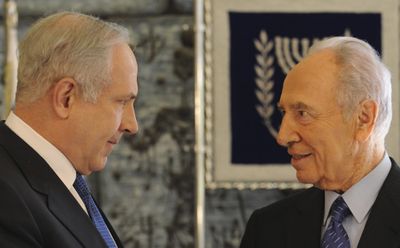Likud’s Netanyahu asked to form new government

JERUSALEM – Ten days after inconclusive national elections, Israeli President Shimon Peres formally asked Likud leader Binyamin Netanyahu on Friday to form the next government. Although the centrist Kadima party, headed by Foreign Minister Tzipi Livni, won 28 seats to Likud’s 27, a majority of parliament members said they supported Netanyahu for prime minister.
Livni has said she will not join a Netanyahu-led government and is prepared to lead Kadima into opposition.
If Netanyahu is unable to change Livni’s mind, he will form a narrow right-wing government made up of 65 out of 120 Knesset members. Several of the far-right parties in the government have already said they would join a Likud-led coalition. But they are demanding that Netanyahu expand Jewish settlements in the West Bank, a move that would put the new Israeli government on a collision course with the Obama administration. And the smaller parties disagree among themselves on religious and other issues.
Netanyahu has six weeks to form a coalition, by either overcoming those divisions or convincing Livni and the head of the Labor Party, Ehud Barak, to join him in a broad unity government. A poll published in the Jerusalem Post newspaper this week found two-thirds of the Israeli public support a broad national unity government.
“Let’s unite to secure the future of the state of Israel,” Netanyahu said, addressing Livni and Barak, after meeting with Peres on Friday. “I ask to meet with you first to discuss a broad national unity government.”
But at least for now, both Barak and Livni say they will go into opposition.
“A broad coalition has no value if it does not lead the way,” Livni said after meeting Peres. “This is a coalition that will damage the country.”
If Netanyahu is unable to convince Livni to join his government, he will turn to a series of smaller parties who have already said they will be part of his coalition. The largest of these, Yisrael Beitenu, is headed by Russian-born Avigdor Lieberman and won 15 seats in the elections, edging out the center-left Labor party. Yisrael Beitenu – Hebrew for “Israel Our Home” – is widely supported by Israel’s Russian immigrant population. The party wants a law permitting civil marriage and divorce in Israel, which currently allows only religious marriage and divorce proceedings. Lieberman has also sparked controversy in Israel with his support of a loyalty oath that Arab citizens of Israel would be forced to take to maintain their citizenship.